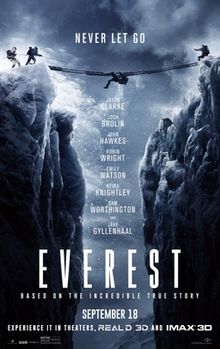Film Review: Everest – The Story of the Worst Disaster on the World’s Highest Mountain
 Many years ago I picked up a book called Into the Wild and it introduced me to the author Jon Krakauer. The front cover told me that Krakauer, an accomplished amateur climber himself, was also the author of Into Thin Air, Krakauer’s own first hand account of the Everest disaster of 1996. Picking through the rest of the books I soon found Into Thin Air. Buying both I nipped on home and set about reading them. In truth I devoured them, Into Thin Air in particular. At that time I knew a little about the Everest disaster and, like the saying goes, a little knowledge is often worse than none at all. I knew that a summit attempt went wrong and several people died, but not the details, not the series of events that culminated in the greatest Everest disaster to date. While this film is not based on Krakauer’s first hand account of that tragedy, for years after reading Into Thin Air, I felt that it was a story just waiting to be filmed, one that needed to be told. On the eve of the 20th anniversary of those fateful days in May 1996, Baltasar Kormakur has given us that film.
Many years ago I picked up a book called Into the Wild and it introduced me to the author Jon Krakauer. The front cover told me that Krakauer, an accomplished amateur climber himself, was also the author of Into Thin Air, Krakauer’s own first hand account of the Everest disaster of 1996. Picking through the rest of the books I soon found Into Thin Air. Buying both I nipped on home and set about reading them. In truth I devoured them, Into Thin Air in particular. At that time I knew a little about the Everest disaster and, like the saying goes, a little knowledge is often worse than none at all. I knew that a summit attempt went wrong and several people died, but not the details, not the series of events that culminated in the greatest Everest disaster to date. While this film is not based on Krakauer’s first hand account of that tragedy, for years after reading Into Thin Air, I felt that it was a story just waiting to be filmed, one that needed to be told. On the eve of the 20th anniversary of those fateful days in May 1996, Baltasar Kormakur has given us that film.
While waxing lyrical about Watson, Brolin, Worthington and Gyllenhall and the strength of the ensemble cast, Everest centres itself around Rob Hall, the leader of the Adventure Consultants team. With Australian actor Jason Clarke cast as Hall, Everest needed an immense performance from him and thankfully he delivers in absolute spades. Held in the highest esteem by fellow climbers, Hall became synonymous with Everest after successfully guiding 39 people to the summit with zero casualties. Loved and respected, Clarke had massive shoes to fill, a challenge that he does not shirk. He is the heart of this film and though his clients pay him to take them to the summit, Clarke conveys Hall’s humanity so well. You know that he cares for each and every one of them, wanting each to achieve their goal of climbing the highest peak in the world. Cradling a crying climber who has just touched the summit of Everest, he tells her that is so proud of her and I defy even the hardest of hearts not to well up just a little. So convincing is Clarke that you forget he’s an actor, he is Rob Hall. Clarke handles the complexities of the role extremely well; Hall was known as the “mountain goat” or the “show” as he was the safest climber on Everest, the only show in town and he struggled with keeping people safe while keeping their dreams alive. Indeed it could be this desire to help those who want to summit Everest that attributed to the tragic outcome of this expedition. Clarke is absolutely remarkable, giving one of his strongest performances yet.
Everest is in cinemas now. Check out the trailer below.
[youtube id=”5ZQVpPiOji0" align=”center” autoplay=”no” maxwidth=”750"]
Featured image credit: gearjunkie.com
Photo credits: rte.ie, wikiedia.com


